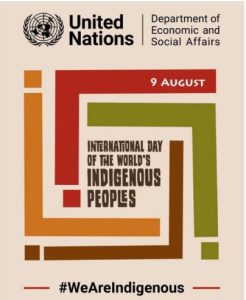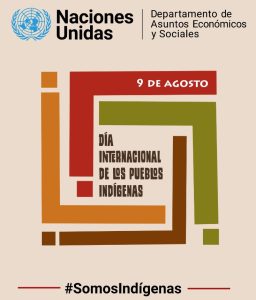International Day of the World’s Indigenous People dates back to 1982, the date of the first session of the Working Group on Indigenous Populations. It calls all of us to recognize and celebrate the achievements and contributions of indigenous communities around the world and to advocate for their  rights. The theme for this year is Indigenous Youth as Agents of Change for Self-Determination.
rights. The theme for this year is Indigenous Youth as Agents of Change for Self-Determination.
There are more than 400 million indigenous people in the world spread out over 90 countries, representing 5000 different cultures and speaking 7000 different languages. They represent the greater part of the world’s cultural diversity. Although they comprise 15% of the world’s population, they are 15% of the world’s poorest people. Many indigenous peoples continue to face racial discrimination, marginalization, extreme poverty and other violations of human rights. Despite this, they play a significant role in sustaining the diversity of the world’s cultural and biological landscape. Indigenous people generally have a deep bond with nature and are involved in the protection and preservation of our shared environment.
Let us be mindful of our own indigenous people in Newfoundland and Labrador and throughout Canada who are continuing their struggle for recognition, respect and reconciliation.
El Día Internacional de las Poblaciones Indígenas del Mundo se remonta a 1982, fecha de la primera sesión del Grupo de Trabajo sobre Poblaciones Indígenas. Nos llama a todos a reconocer y celebrar los logros y contribuciones de las comunidades indígenas de todo el mundo y a defender sus  derechos. El tema de este año es La juventud indígena como agente de cambio para la autodeterminación.
derechos. El tema de este año es La juventud indígena como agente de cambio para la autodeterminación.
En el mundo hay más de 400 millones de indígenas repartidos en 90 países, que representan 5.000 culturas diferentes y hablan 7.000 lenguas distintas. Representan la mayor parte de la diversidad cultural del mundo. Aunque representan el 15% de la población mundial, son el 15% de las personas más pobres del mundo. Muchos pueblos indígenas siguen sufriendo discriminación racial, marginación, pobreza extrema y otras violaciones de los derechos humanos. A pesar de ello, desempeñan un papel importante en el mantenimiento de la diversidad del paisaje cultural y biológico del mundo. Por lo general, los pueblos indígenas mantienen un profundo vínculo con la naturaleza y participan en la protección y preservación de nuestro entorno común.
Tengamos presentes a nuestros propios pueblos indígenas de Terranova y Labrador y de todo Canadá, que siguen luchando por el reconocimiento, el respeto y la reconciliación.


